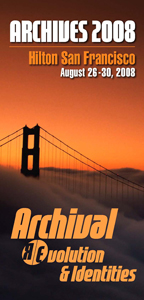 I got the word just before the holidays – the panel proposal of which I was a part has been accepted for SAA 2008 in San Francisco . The title of the panel is ‘After the Revolution: Unleashing the Power of EAD’ and the working title for my paper/presentation is ‘Visualizing Archival Collections: Leveraging the Power of EAD’.
I got the word just before the holidays – the panel proposal of which I was a part has been accepted for SAA 2008 in San Francisco . The title of the panel is ‘After the Revolution: Unleashing the Power of EAD’ and the working title for my paper/presentation is ‘Visualizing Archival Collections: Leveraging the Power of EAD’.
My co-presenters are Max Evans (currently of the NHPRC, soon to be of the LDS Church Historical Department) and Elizabeth Yakel (of University of Michigan, School of Information). Jodi Allison-Bunnell from Northwest Digital Archives, Orbis Cascade Alliance is our panel Chair.
This is the description of our panel that we submitted with our proposal:
Encoded Archival Description (EAD) was created in 1995 to increase uniformity and interoperability of data about archival collections to facilitate discovery. It has yet to realize that goal: most online finding aids merely recreate paper documents. Speakers will demonstrate how the structured, standardized nature of EAD can form the basis of user-friendly interfaces and finding aids that can accommodate multiple perspectives and utilize graphical and visual interfaces–while faithfully recording and presenting the context, structure, and content of the collection. Panelists will also address the challenges of unleashing the power of EAD, including normalizing XML, the lack of standard values for cross-institutional aggregation of data, and different approaches to subject terms, with a discussion of the technological and practical issues that surround them. The session relates to the SAA strategic priorities of technology and public awareness and engages elemental questions of revolutionary and evolutionary change.
My portion of the panel will focus on my ArchivesZ information visualization project. I will be discussing both the power of this type of graphical interface to archival collections as well as addressing the roadblocks to their practical implementation. My plan is to continue the work I started last Spring over the course of this Spring and Summer – and show off a new version of ArchivesZ in San Francisco (as well as online here of course!).
Here are the descriptions of Max, Elizabeth and Jodi’s planned contributions (cribbed from our proposal submission):
- Max Evans will explore the fundamental purposes of finding aids and explore what can be done to leverage EAD’s structure to render graphical, informative, and elegant finding aids online.
- Elizabeth Yakel will discuss usability test findings and how these were incorporated into the EAD-based Polar Bear Expedition Digital Collections to allow communities to engage with collections in new ways.
- Jodi Allison-Bunnell brings a lively interest in user-centered presentations of finding aids that emerge from her work as manager of a five-state EAD consortium.
I am so pleased and excited. So – who is planning on going to San Fransisco in August? I hope to see you there.
Image Credit: Society of American Archivists, ARCHIVES 2008: Archival R/Evolution & Identities web page.
Very cool! Congratulations, Jeanne! I am hoping to get on an SAA panel in the next couple of years (probably something appraisal or outreach related) so it’s encouraging to see someone at about the same place in their career as me get there.
I am hoping that the UWM Libraries give me enough money to attend SAA *crosses fingers*. It was nice having it in DC in 2006 and in Chicago in 2007, both of which were sites that made it easy to attend; San Francisco’s a BIT harder. Even if I don’t get ze money, I may go anyway because I’ve never been to SF. I’ll be sure to track you down if I do, and if I don’t, you’re going to put your presentation up on the (presumably upcoming) SAA2008 wiki, right? 😉
Thanks for the kind words! Yes – the final version of my presentation will definitely be online (likely posted here and linked to from the SAA2008 wiki), but I hope to see you there!
If I make it to San Fransisco, I’ll definitely be attending!
I agree that the EAD finding aids I’ve seen have been problematic because they seem to, as you say, basically re-create the paper finding aid. I think they’re an important step in the right direction in terms of exposing heretofore hidden collections, but until I see that there are possiblities for serious increases in functionality and user-friendliness, I’ll probably remain a skeptic…but I have a feeling that if any panel discussion could bring me around on this topic, it’s probably this one!
Looking forward to it!
Pingback:structured facilitation
To all of you interested in using EAD metadata for digitizing entire collections, please check out the Archives of American Art’s COLLECTIONS ONLINE site at http://aaa.si.edu/collectionsonline/
AAA is digitizing entire manuscript collections, ranging from a few documents to collections over 20 linear feet, and using EAD xml metadata to link the digital files and present the collection online in context. When viewing the collection, one is actually viewing the digital files via a finding aid.
The approach is unique and innovative and has successfully integrated mass digitization into the processing and descriptive archival workflow.